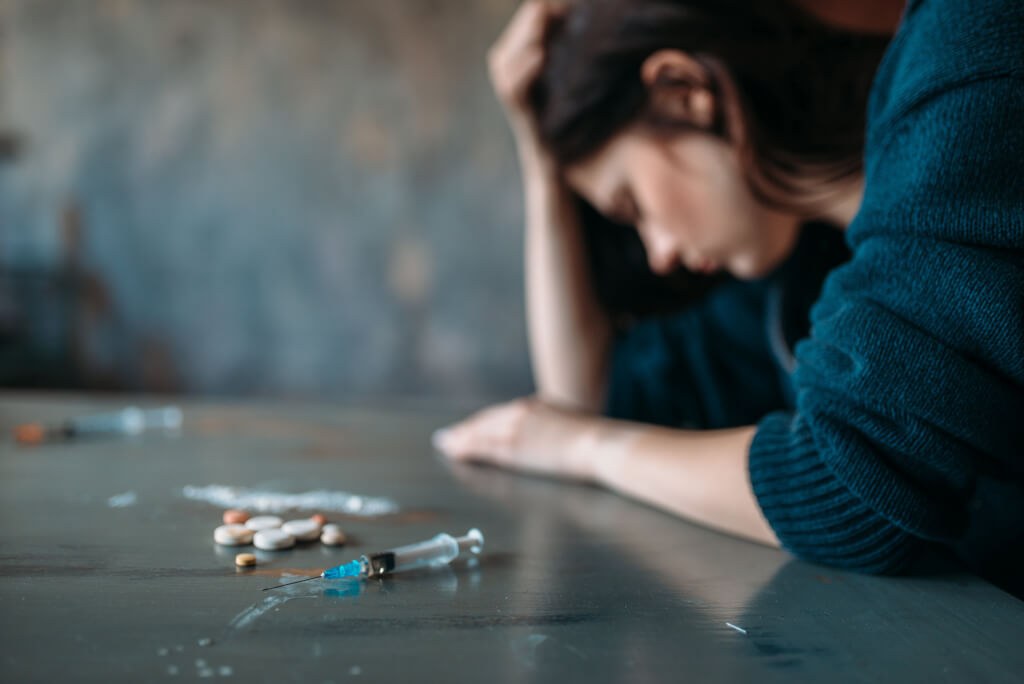The world of addiction to drugs and alcohol involves some painful truths. Coming to terms with having a substance use disorder takes bravery and a commitment to getting sober. The first step involves detoxing from the substances and then resisting the urges to start using them again. Some drugs prove more difficult to stop using than others, making detoxing from them a challenge for anyone. We break down a list of the hardest drugs to quit.
List of the Hardest Drugs to Quit
Each drug has it’s own unique effects and withdrawal symptoms which typically make one drug more difficult to quit compared to another. Below, we will go through each type of drug that people use and why those drugs are hard to quit.
Alcohol
People abuse alcohol in higher numbers than any other drug. The National Survey on Drug Use and Health (NSDUH) reports that about one-fourth of people 18 and over say they engaged in binge drinking alcohol at least once in the past month. The report further states that 14.5 million people ages 12 and up have an alcohol use disorder. For those ages 12 to 17, approximately 414,000 are addicted to alcohol. Only about 7% of all people with an addiction to alcohol received treatment for it in the past year.
Alcoholism can do major damage to a person’s health. People addicted to alcohol often develop symptoms of depression and other mood-related disorders. Common symptoms experienced when a person stops using alcohol include:
- Headache
- Nausea
- Vomiting
- Insomnia
- Confusion
- Shaking
- Depression
- Anxiety
- Sweating
- High blood pressure
- Seizures
- Hallucinations
Cocaine
Cocaine is easily on the list of hardest drugs to quit. It is a stimulant drug that people snort in powder form or inject. A rock form called “crack” is smoked. The impact of using cocaine feels short-lived, causing people to need to use the drug repeatedly. As tolerance to coke increases, a person needs to use more and more to achieve the desired effect. Addiction to cocaine can set in quickly.
Approximately 5 million Americans use cocaine on a regular basis. In 2017, one out of every five overdose deaths involved cocaine. The most popular age group for cocaine usage is 18 to 25.
When detoxing from cocaine, some of the most common side effects include:
- Difficulty sleeping
- Lethargy
- Difficulty thinking and concentrating
- Chills
- Muscle aches
- Nerve pain
- Nightmares
- Inability to feel pleasure, including sexual arousal
- Depression
- Anxiety
- Suicidal thoughts
Methamphetamine
A man-made stimulant narcotic, methamphetamines come in powder form. The crystal form is referred to as “crystal meth”. Meth is smoked, injected, and snorted, causing a powerful but short-lived high. Many people experience bursts of aggressive and violent behavior when under the influence of meth.
NSDUH reports that almost one million people in the U.S. ages 12 and up have a methamphetamine use disorder. Meth is available nationwide, but its highest prevalence exists in the western and midwestern areas. More than 70% of law enforcement agencies in the Pacific and West Central regions of the U.S. state that methamphetamines provide the greatest threat to their communities.
Symptoms experienced when detoxing from meth may include:
- Insomnia
- Fatigue
- Fever
- Paranoia
- Hallucinations
- Sweating
- Agitation
- Depression
- Anxiety
- Suicidal thoughts
These symptoms can be so intense and prolonged that it is no wonder why meth is on the list of hardest drugs to quit.
Heroin and Opioids
Opioids come in the form of heroin, commonly purchase as a street drug, and in prescription form. Ingesting heroin involves injecting, snorting, and smoking it. An opioid epidemic began in the early 2000s in the U.S. with an enormous spike in the number of people who abuse prescription opioids.
The National Institute on Drug Abuse reports that as recently as 2019, almost 50,000 Americans died from an opioid-related overdose. Approximately 21-29% of patients who are prescribed opioids for chronic pain end up misusing them, with 8-12% developing an addiction. About 80% percent of individuals who use heroin started out by first misusing prescription opioids.
Common prescription opioid medications include Vicodin, oxycodone, codeine, fentanyl, morphine, methadone, and codeine. Withdrawal symptoms from heroin and other opioids can include:
- Sweating
- Chills
- Muscle aches
- Nausea
- Vomiting
- Headaches
- Flu-like symptoms
- Shaking
- Difficulty thinking
- Agitation
- Anxiety
- Depression
Treatment for the Hardest Drugs to Quit
One thing that all of the hardest drugs to quit have in common lies in the fact that people need professional treatment in order to stop using them. Trying to stop using drugs and alcohol on their own can be dangerous to an individual. Treatment programs for substance use disorders offer an array of options to help a person begin to reclaim their health and lives.
Detoxification programs (“detox, for short) provide the first step in recovering from the hardest drugs to quit. Detox treatment provides round-the-clock medical care for an individual who will need support going through the physical symptoms of withdrawal. After completion of detox, many people move into a residential or outpatient program. Sober living houses also provide a safe space to spend the first weeks and months of sobriety while accessing professional help.
Begin Drug Detox at Home
If you are experiencing an addiction to any substance, whether they are on our hardest drugs to quit list or not, MD Home Detox provides a unique service for individuals committed to choosing recovery. We provide a detox program in the comfort and privacy of your home that includes 24/7 medical care and supervision. We also offer access to sober companions, nutritionists, and assistance with grocery shopping and meal planning while you concentrate on your health.
Call MD Home Detox at (888) 592-8541 or click here to email us.

